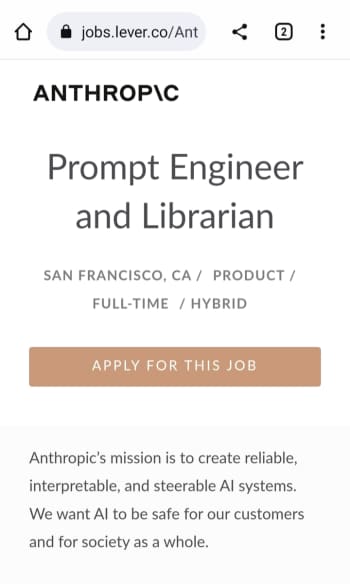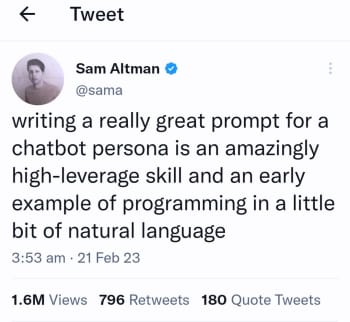Prompt Engineer: Tech's hottest job title?

When a job posting offering a salary range of $250k-$335k went viral, job seekers scrambled to get a closer look. At first glance, it seemed like an opportunity too good to pass up. What truly, however, piqued their interest was the job title: Prompt Engineer. For many, the title may be unfamiliar, even obscure. However, it is a vital role in the development of artificial intelligence language models, particularly in natural language processing (NLP).
In the vast annals of artificial intelligence, few developments have sparked the imagination and innovation of ChatGPT. While there are longstanding concerns over job loss, a new wave of AI-based firms are forging ahead, exploring new use cases and business models – and creating new jobs in the process. "Prompt engineer" is one of them. As an essential building block, this enables AI language models to grasp and interact with human language in a way that feels natural and intuitive.
Today, as we teeter on the brink of a new era of artificial intelligence with transformative tools like ChatGPT blazing a trail of remarkable progress, the potential for further further breakthroughs is boundless, and the fervor surrounding it is palpable. And for those looking to be at the forefront of AI breakthrough, a career in prompt engineering could be a golden ticket to riding the wave of progress in the realm of AI.

Can prompt engineering withstand the test of time? Does it make a compelling career path? Let's dive in.
What is prompt engineering?
AI tools such as MidJourney and ChatGPT rely on a set of instructions known as a "prompt" to receive guidance from humans. The process of designing and adjusting these instructions is referred to as "prompt engineering", a crucial skill for unleashing the productivity benefits offered by AI tools. Put simply, prompt engineers are the masterminds behind the curtain, carefully crafting and refining natural language instructions to achieve specific goals and tasks.
From chatbots that can answer customer queries to virtual assistants that can help you manage your schedule, prompt engineering is the driving force that connects humans with machines. By using machine learning and data analysis, prompt engineers continually fine-tune their prompts, creating AI models that are constantly improving and evolving.
Good enough as a career path?
Imagine being the master of language, the architect of prompts that guide the most advanced language models such as GPT-3, DALL-E, and Midjourney to generate relevant outputs. That's precisely what a prompt engineer does. The role is not just about giving instructions – it requires a deep understanding of the task or application, the model's capabilities and limitations, and potential biases in the data.
As AI and NLP continue to grow in demand, a career in prompt engineering could be a rewarding path for those with the right skills and mindset.
Experts predict that just like Googling was a game-changer in the early 2000s, prompt engineering will soon become an essential skill for every internet user. Trainers and coaches are already offering courses on this burgeoning field, with platforms like Udemy offering several courses and code hosting platform GitHub offering detailed guides. And then there are advanced search engines like PromptHero and Promptist that can help with your prompts.
According to Sam Altman, CEO of OpenAI, prompt engineering is "an amazingly high-leverage skill and an early example of programming in a little bit of natural language."
There are people on the other side registering their apprehension, arguing that this role is unlikely to thrive in future. Ethan Mollick, an associate professor at the Wharton School, believes, as he puts in a LinkedIn post, that AI is getting easier, and prompt engineering may eventually become less important.
"The next big job skill isn't going to be prompt engineering," according to Rachel Woods, a former Meta data scientist and Founder of The AI Exchange. While prompt engineering may have its moment in the spotlight, Rachel, in a LinkedIn post, says, the real job skill of the future is "AI literacy". “If you can demonstrate the mastery of real world applications of AI skill, you will be highly sought after,” she adds.
What skill sets does it demand?
Understanding of the task: A prompt engineer must possess a good understanding of the task or application for which the language model will be used.
Technical Skills: The engineer should have a good understanding of machine learning, natural language processing and their underlying structure and function, and related technologies, as well as programming skills. An understanding of the language model's capabilities and limitations is equally important.

Creativity, clarity: The ability to design creative and varied prompts is crucial for prompt engineers. Well-crafted prompts encourage the model to generate interesting and diverse outputs. Clear and concise prompts are essential to ensuring that the model stays on track and understands the task at hand.
Testing and Evaluation: The prompt engineer must have the ability to test and evaluate the model's output. By leveraging this ability, the engineer can continuously improve the model's performance.
Improvement and Adjustment: A prompt engineer should always monitor the prompts' performance and adjust them as necessary to achieve the best possible outcome.
Familiarity with Data Bias: The engineer should be familiar with the potential biases in the training data of large language models and design prompts that minimise them.
Collaboration: Prompt engineering calls for the art of collaboration with multiple stakeholders including data scientists, engineers, and product managers.
Furthermore, creating core principles that can translate use-case scenarios is important for creating coherent prompts that can be used in multiple real-world situations.
What's the future and its potential impact?
Increasingly complex language models demand engineers who can design prompts that drive behaviour in a precise manner.
One of the significant potential impacts of prompt engineering lies in the healthcare industry, where language models can assist medical professionals in diagnosing diseases and developing treatment plans. However, for them to generate accurate information, prompt engineers must design prompts that provide the necessary information and context. Similarly, in the finance industry, prompt engineering can be applied to analyse data and make investment decisions. By utilising well-designed prompts, language models can analyse market trends and predict future financial performance, enabling investors to make informed decisions.
Prompt engineering can also have a transformative effect on education, facilitating the development of intelligent tutoring systems that adapt to students' learning styles and preferences. By analysing students' performance data and providing tailored prompts, language models can significantly enhance their learning outcomes. Moreover, in entertainment, prompt engineering can generate more immersive experiences by creating interactive virtual environments that provide context and guidance.
As language AI technology such as NLP continues to advance, it's clear that we're on the cusp of an AI revolution that will reshape the world as we know it, creating exciting new job titles and roles – like the early pioneer of prompt engineering. While it remains to be seen what the future holds, one thing is certain: the possibilities that artificial intelligence solutions can unlock are endless!















